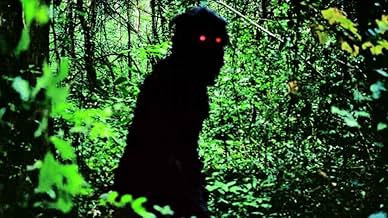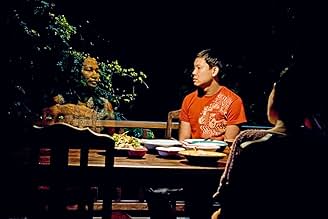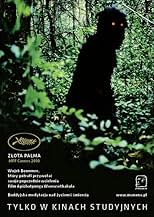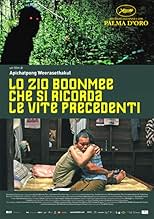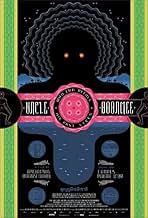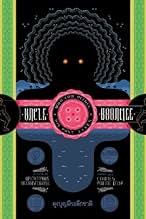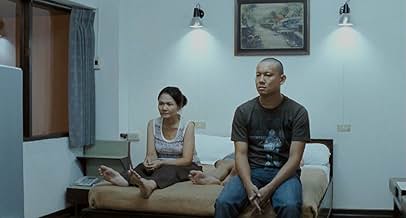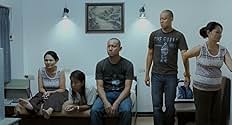Uncle Boonmee erinnert sich an seine früheren Leben
Originaltitel: Loong Boonmee raleuk chat
IMDb-BEWERTUNG
6,7/10
18.381
IHRE BEWERTUNG
Ein Mann, der an einer Nierenerkrankung sterben wird, verbringt seine letzten, düsteren Tage in einem Farmhaus im Norden Thailands mit seiner Familie, zu der auch der Geist seiner verstorben... Alles lesenEin Mann, der an einer Nierenerkrankung sterben wird, verbringt seine letzten, düsteren Tage in einem Farmhaus im Norden Thailands mit seiner Familie, zu der auch der Geist seiner verstorbenen Frau und sein Sohn in Gestalt eines Waldgeistes gehören.Ein Mann, der an einer Nierenerkrankung sterben wird, verbringt seine letzten, düsteren Tage in einem Farmhaus im Norden Thailands mit seiner Familie, zu der auch der Geist seiner verstorbenen Frau und sein Sohn in Gestalt eines Waldgeistes gehören.
- Regie
- Drehbuch
- Hauptbesetzung
- Auszeichnungen
- 11 Gewinne & 25 Nominierungen insgesamt
Kanokporn Tongaram
- Roong
- (as Kanokporn Thongaram)
- …
Empfohlene Bewertungen
I really do wish I could like this. As it is, I think it has some dazzling sequences, and some really atmospheric and hypnotizing scenes. For the most part though, it didn't amount to much for me, and that's because I was just really bored by a lot of it. This really just comes down to whether one is hypnotized or bored by it, and unfortunately for me it was the latter. That doesn't mean that it's an awful film, it has way too much originality in what I saw to label it as such (and whether it has anything to really say is anyone's guess). Still, I wouldn't recommend this to most people, simply because it's so hard to get into. Not recommended.
When it comes to art films, there's always been a divide. More casual viewers are more likely to dismiss a lot of them as pretentious and stupid, film buffs are more likely to find them beautiful and above anything you'll spend ten to fifteen to watch in a multiplex today. "Uncle Boonmee Who Can Recall His Past Lives" is one of those films, however, that even divides film buffs amongst themselves. Despite winning Palme D'or, the film has many detractors, and a 6.6 on this site(as of this review). 6.6 isn't bad but far below what you would expect given some of the praise. So, what IS this film exactly?
The title character is a man who is slowly dying, living out with his family for his remaining days. Those days become consumed by flashbacks to past lives (though it's not always clear what that life is or how it relates), being visited by the ghost of his wife, and trying to plan for his after life. The film has a very loose structure. Many people find the pace unbearably slow, I think in part because the film doesn't really build up to anything. To call this film meditative would not be a hyperbole, it's a mellow kind of movie. After watching it, I felt different, like I had been given the world's greatest massage, my muscles loosened up and everything, it's not like anything I've gotten from a movie before. This is helped by the beautiful scenery and cinematography. This is a movie that, if you can't watch it on a big screen with loud speakers, should at least be watched in a dark room with headphones if watching on a laptop/desktop. There's little in way of soundtrack (except for one beautiful song later in the film), but the sounds of nature are beautifully captured.
The actual narrative is composed of many smaller stories, all of which connect with Boonmee. All of them work on their own level, and together do create a low key but very, very touching film. the scene where Boonmee talks to the spirit of his wife about the anxiety he used to have giving speeches may be the highlight there, though the princess story and the final flashback are also up there.
This is a film you have to watch on it's terms. You have to be willing to watch it as a more meditative kind of experience, to simply enjoy it the way one might enjoy a hike in the woods of a car ride. If that's not what you want out of a film, avoid this at all costs.
For me, personally, I was a little hesitant going in, given how divided opinion was, but I'm glad I did, and will certainly watch again. It's a powerful film. It won't necessarily leave you in tears, but it will likely leave an impression on those who gravitate towards things like this.
The title character is a man who is slowly dying, living out with his family for his remaining days. Those days become consumed by flashbacks to past lives (though it's not always clear what that life is or how it relates), being visited by the ghost of his wife, and trying to plan for his after life. The film has a very loose structure. Many people find the pace unbearably slow, I think in part because the film doesn't really build up to anything. To call this film meditative would not be a hyperbole, it's a mellow kind of movie. After watching it, I felt different, like I had been given the world's greatest massage, my muscles loosened up and everything, it's not like anything I've gotten from a movie before. This is helped by the beautiful scenery and cinematography. This is a movie that, if you can't watch it on a big screen with loud speakers, should at least be watched in a dark room with headphones if watching on a laptop/desktop. There's little in way of soundtrack (except for one beautiful song later in the film), but the sounds of nature are beautifully captured.
The actual narrative is composed of many smaller stories, all of which connect with Boonmee. All of them work on their own level, and together do create a low key but very, very touching film. the scene where Boonmee talks to the spirit of his wife about the anxiety he used to have giving speeches may be the highlight there, though the princess story and the final flashback are also up there.
This is a film you have to watch on it's terms. You have to be willing to watch it as a more meditative kind of experience, to simply enjoy it the way one might enjoy a hike in the woods of a car ride. If that's not what you want out of a film, avoid this at all costs.
For me, personally, I was a little hesitant going in, given how divided opinion was, but I'm glad I did, and will certainly watch again. It's a powerful film. It won't necessarily leave you in tears, but it will likely leave an impression on those who gravitate towards things like this.
This movie is meditation, a state of concentration. I only wish I wasn't tired when I saw it last night because my concentration waned, I could feel the movie slipping between my fingers and trying to wilfully sustain the experience can't work. This is a Buddhist film, but it's Thai Buddhist (the form they practice in Thailand came from Sri Lanka and is from the earliest strata of Buddhism), it's spiritual but it's not esoteric in the manner of the Tibetans, ancient but not arcane. It's not Buddhist because Boonmee may or may not be recalling on his deathbed his past and future lives, or because there are ghosts and demons and a talking catfish, this is colorful lore, the illusory flowers of mind. It's Buddhist because it's aware of the moment. Not so strangely, it's the fantastical bits that seem to make the film watchable for most people, yet if we come to this film to satisfy our need for something to happen, we break the spell. The spell here for me is the awareness of life as is, the clear vision of a heaven in the present world.
Here's a camera that doesn't describe a world, it allows it to emerge in its own time. Sometimes this tests my patience but I appreciate that it doesn't make amends and concessions. Cessation, stillness of mind, true perception, these are all vital and desirable here, and they can only happen in their own time, they can't be forced. I appreciate that and I appreciate the limitations of my own viewing. In those moments that my eyes and the movie adjust, I am blissful. Two moments exemplify this, the one is a table out in the verandah by night, insects buzzing around a light and everything is quiet, this is the summer night for me. The other is Uncle Boonmee lying down on a bed in his honeykeeping shed, it's noon and crickets are humming from the trees, this is the summer day. It reminds me of the remembrance of spring in Kiarostami's The Wind Will Carry Us.
The finale is rather interesting, despite the above. A lot of viewers seem to regard it as Weeresethakul's comment on the alienation fostered by the niceties of modern society. It is its own comment on the place of Buddhism in one such society, where the garments of the monk mean nothing, but instead of inferring that a day's hard work out in the open is preferable to watching TV Weeresethakul could have not made a movie to begin with (that calls for us to sit alone from one another in a dark room where flickering lights are projected).
But I don't think that such a simple conclusion was what was intended. I see vision that wants to encompass the world of ambiguities. The family may be sitting in the silent, staring at a box, but I got the sense of quiet warmth coming from the simple togetherness, a certain soothing affect that is possible only in people who can sit together without a need for words. Who can relax simply in the presence of each other.
This is valuable work, and I believe it will be cherished by viewers who feel the chakras of cinema should be purified and set ablaze now and then.
Here's a camera that doesn't describe a world, it allows it to emerge in its own time. Sometimes this tests my patience but I appreciate that it doesn't make amends and concessions. Cessation, stillness of mind, true perception, these are all vital and desirable here, and they can only happen in their own time, they can't be forced. I appreciate that and I appreciate the limitations of my own viewing. In those moments that my eyes and the movie adjust, I am blissful. Two moments exemplify this, the one is a table out in the verandah by night, insects buzzing around a light and everything is quiet, this is the summer night for me. The other is Uncle Boonmee lying down on a bed in his honeykeeping shed, it's noon and crickets are humming from the trees, this is the summer day. It reminds me of the remembrance of spring in Kiarostami's The Wind Will Carry Us.
The finale is rather interesting, despite the above. A lot of viewers seem to regard it as Weeresethakul's comment on the alienation fostered by the niceties of modern society. It is its own comment on the place of Buddhism in one such society, where the garments of the monk mean nothing, but instead of inferring that a day's hard work out in the open is preferable to watching TV Weeresethakul could have not made a movie to begin with (that calls for us to sit alone from one another in a dark room where flickering lights are projected).
But I don't think that such a simple conclusion was what was intended. I see vision that wants to encompass the world of ambiguities. The family may be sitting in the silent, staring at a box, but I got the sense of quiet warmth coming from the simple togetherness, a certain soothing affect that is possible only in people who can sit together without a need for words. Who can relax simply in the presence of each other.
This is valuable work, and I believe it will be cherished by viewers who feel the chakras of cinema should be purified and set ablaze now and then.
In order to appreciates the film, you have to understand that this movie is not just a normal film where you can expects classical narrative and plot. the directer not only have Buddhism as a philosophical point of view but he also put a little bit of Thai historical and political aspects in to the film.
In my opinion, the theme of this film is the man's struggle from human condition and transformation.
here are some few points I'd like to make concerning the film:
1. Man and Illusion
Before humankind, there was nature, which is pure and true. there are trees and wind and animals and so on. then there are man, which is basically another living specie. both animal and human have the same drive (sex, food, shelter etc.) the only different between man and animal is the ability to understand "sign" (read semiotic for more understanding) thus, human being created language, painting and symbol and so on. in other word, because our brain can perceived sign, so we can created ART. Art was created by man since the days of the cave man i.e. cave painting in Lascaux, France. (did you noticed that there are also cave paintings in the film?)
Man are proud that we are the only specie that can create and appreciate art, but what we didn't realized is that we are also the only specie that have the ability the created the illusion/lie/falsehood. Because of evolution, our unique brain can store memories and emotion, mix it up, and then created stuffs from it. because of this, the more time pass, the more we are far away from the truth; culture, law, politic, social status etc. are all MAN-MADE ILLUSION
2. Illusion of Dualism
It's seems like our perceived reality of "duality in nature" is embedded in our brain. we separated things into yin/yang mentality: day/night, good/bad, man/woman, live/death. one scene in particular shows how Boonmee kill the worms in his tamarind tree because "it's pest". then the next scene he show his sister the bee hive and seems very protective of it (he explain to his sister to avoid the larvae area on the plate). When he told his sister that his condition is the result of his karma from killing COMMUNIST and PEST, his sister replied "it's alright because you have good intention". When did killing other being can become good intention? Aren't communist human too? Aren't pests and bees are both insects?
3. The role of photography/Film, Memories, and Reality
Roland Barthes, in his book "Camera Lucinda", explained that a picture creates a falseness in the illusion of 'what is', where 'what was' would be a more accurate description. We can see a lot of scene involved photography; from the photos Boonmee shows to his dead wife as a proof of her funeral, the obsession of his son before he became a monkey, the final scene which Boonmee told the story about his dream etc. (this is an important scene, we will talk about it later)
4. In the playground, we created the rules, then we fought each other
In the film, we see peoples who of separated by this so-called man-made illusion, for example, different nationalities and spoken languages (Thai vs Laos), (Laos vs French) (Isan vs. Central Thai) etc. If you know little bit about Thai history, you will understand that the director also talk about the official vs the people / communism vs democracy(?).
in the final scene where Boonmee told the story about his dream, we see people wearing uniform. They are obviously appointed as "Soldier/Army". Then in the next photo we saw these soldiers captured the Monkeys Ghost. If you watch the film until this point, by now you should realized that the Monkey ghost is the allegory of the Communist.
then in the next photo, we saw that the soldier now taking their clothes off and play other kind of war game (throwing rock). The most funny thing is in the last photo, we saw 2 circles draw on the ground. In my opinion, the director suggest that countries, border dispute and war are nothing but a child's game.
5. Jāti: literally birth, but life is understood as starting at conception
the word "ชาติ" in Thai word derived from Sanskrit "Jāti", when translated to English it simply means "live". hence the name of the film "Uncle Boonmee who can recall his past lives" but in fact, the word Jati is the term in Buddhism which is not simply translate as "live" but have a lot more profound meaning.
By the way, I have the same feeling watching this film and Kubrick's 2001: Space Odyssey. Maybe because it also dealt with the theme of human condition and transformation, but this film is from the Eastern Philosophy point of view, of course.
In my opinion, the theme of this film is the man's struggle from human condition and transformation.
here are some few points I'd like to make concerning the film:
1. Man and Illusion
Before humankind, there was nature, which is pure and true. there are trees and wind and animals and so on. then there are man, which is basically another living specie. both animal and human have the same drive (sex, food, shelter etc.) the only different between man and animal is the ability to understand "sign" (read semiotic for more understanding) thus, human being created language, painting and symbol and so on. in other word, because our brain can perceived sign, so we can created ART. Art was created by man since the days of the cave man i.e. cave painting in Lascaux, France. (did you noticed that there are also cave paintings in the film?)
Man are proud that we are the only specie that can create and appreciate art, but what we didn't realized is that we are also the only specie that have the ability the created the illusion/lie/falsehood. Because of evolution, our unique brain can store memories and emotion, mix it up, and then created stuffs from it. because of this, the more time pass, the more we are far away from the truth; culture, law, politic, social status etc. are all MAN-MADE ILLUSION
2. Illusion of Dualism
It's seems like our perceived reality of "duality in nature" is embedded in our brain. we separated things into yin/yang mentality: day/night, good/bad, man/woman, live/death. one scene in particular shows how Boonmee kill the worms in his tamarind tree because "it's pest". then the next scene he show his sister the bee hive and seems very protective of it (he explain to his sister to avoid the larvae area on the plate). When he told his sister that his condition is the result of his karma from killing COMMUNIST and PEST, his sister replied "it's alright because you have good intention". When did killing other being can become good intention? Aren't communist human too? Aren't pests and bees are both insects?
3. The role of photography/Film, Memories, and Reality
Roland Barthes, in his book "Camera Lucinda", explained that a picture creates a falseness in the illusion of 'what is', where 'what was' would be a more accurate description. We can see a lot of scene involved photography; from the photos Boonmee shows to his dead wife as a proof of her funeral, the obsession of his son before he became a monkey, the final scene which Boonmee told the story about his dream etc. (this is an important scene, we will talk about it later)
4. In the playground, we created the rules, then we fought each other
In the film, we see peoples who of separated by this so-called man-made illusion, for example, different nationalities and spoken languages (Thai vs Laos), (Laos vs French) (Isan vs. Central Thai) etc. If you know little bit about Thai history, you will understand that the director also talk about the official vs the people / communism vs democracy(?).
in the final scene where Boonmee told the story about his dream, we see people wearing uniform. They are obviously appointed as "Soldier/Army". Then in the next photo we saw these soldiers captured the Monkeys Ghost. If you watch the film until this point, by now you should realized that the Monkey ghost is the allegory of the Communist.
then in the next photo, we saw that the soldier now taking their clothes off and play other kind of war game (throwing rock). The most funny thing is in the last photo, we saw 2 circles draw on the ground. In my opinion, the director suggest that countries, border dispute and war are nothing but a child's game.
5. Jāti: literally birth, but life is understood as starting at conception
the word "ชาติ" in Thai word derived from Sanskrit "Jāti", when translated to English it simply means "live". hence the name of the film "Uncle Boonmee who can recall his past lives" but in fact, the word Jati is the term in Buddhism which is not simply translate as "live" but have a lot more profound meaning.
By the way, I have the same feeling watching this film and Kubrick's 2001: Space Odyssey. Maybe because it also dealt with the theme of human condition and transformation, but this film is from the Eastern Philosophy point of view, of course.
For those who have not heard of Thai filmmaker and artist Apichatpong Weerasethakul, I guess you must have heard of his latest film Uncle Boonmee Who Can Recall His Past Lives, winning the Palme d'Or at last year's Cannes Film Festival, and being the first Southeast Asian director to do so. That should interest you to take that leap of faith to experience the coming of Uncle Boonmee yourself, and that feeling of being frustrated yet enthralled, fascinated yet perplexed, all at the same time, fighting to stay engaged, and making sense of the visuals flitting around dreamscapes.
This film is like a diamond with many different cuts made to make it shine, each representing a facet from which you can choose to look at, or interpret from. Like a prism which dissipates light shone on it, your take on this film will likely be entirely different from mine, and what more, you'll probably have different takes on each of the different aspects of the film, since the scenes that make it up are as disparate as can be. It makes the film going experience a little more interesting since it's open, and never crystal clear given the takeaways for one based on one's journey in life thus far.
At its crux, the story is exactly that of its title, where we see Uncle Boonmee (Thanapat Saisaymar) living the last days of his life with kidney failure, choosing like most Asians do with the preference to live out the last days at the comfort of one's home, rather than at a sterile hospital. It is said that those on the death bed will see their life flash pass their eyes, but for Uncle Boonmee, his plodding walk toward the light at the end of the tunnel, means giving the film a lot more exploratory path to tread on, with a look at what his past lives were as well, ranging from the suggested buffalo, to even a member of the aristocracy (and that much talked about scene with the catfish. Hmm... maybe he could be the catfish too!)
Things get a lot stranger of course, even as it seems that Boonmee can remember his previous lives before reincarnation. As far as my limited grasp of that process goes, one has to drink up a liquid that will make you forget what you've gone through, and one's karma accumulation has bearings on what next you'll be incarnated, with the human form being quite OK, rather than an animal. I suppose Boonmee in his previous life did OK to be reincarnated as a human in this life, and in his last days get visited by his late wife (Natthakarn Aphaiwonk) with whom he shares a poignant, heart-wrenching scene with, and also a visit from his son (Geerasak Kulhong behind heavy makeup), whom you'd have already have an idea of from the various promotional material, and no, he's not captured in a picture just because the camera did not have an anti-red eye function.
Don't be shy if you don't understand the film. For starters, I suppose any film based on dreams and fantasy opens itself up to a lot of leeway in interpretation, and not taking everything verbatim, verbose or literal. Even the auteur himself has said that you "don't need to understand everything" in an interview with The Guardian, probably a relief for those like me who emerged from the screening with more questions than to know where to begin asking them. Like most art films, this one moves at a leisurely pace, and is filled with plenty of art house sensibilities and techniques, and while I won't say will reward the patient viewer, it will challenge you to think through about what you've just seen, and I felt it was easier to make sense of individual scenes, than as a whole when trying to fit the jigsaw in a coherent fashion.
To paraphrase Bruce Lee, this film is like water, having no form of its own, yet taking up form based on the viewer's individual experience and interpretation. I guess that's what makes Uncle Boonmee unique, coming from a filmmaker who's bold to conceptualize this piece of art that works itself through different strokes for different folks.
This film is like a diamond with many different cuts made to make it shine, each representing a facet from which you can choose to look at, or interpret from. Like a prism which dissipates light shone on it, your take on this film will likely be entirely different from mine, and what more, you'll probably have different takes on each of the different aspects of the film, since the scenes that make it up are as disparate as can be. It makes the film going experience a little more interesting since it's open, and never crystal clear given the takeaways for one based on one's journey in life thus far.
At its crux, the story is exactly that of its title, where we see Uncle Boonmee (Thanapat Saisaymar) living the last days of his life with kidney failure, choosing like most Asians do with the preference to live out the last days at the comfort of one's home, rather than at a sterile hospital. It is said that those on the death bed will see their life flash pass their eyes, but for Uncle Boonmee, his plodding walk toward the light at the end of the tunnel, means giving the film a lot more exploratory path to tread on, with a look at what his past lives were as well, ranging from the suggested buffalo, to even a member of the aristocracy (and that much talked about scene with the catfish. Hmm... maybe he could be the catfish too!)
Things get a lot stranger of course, even as it seems that Boonmee can remember his previous lives before reincarnation. As far as my limited grasp of that process goes, one has to drink up a liquid that will make you forget what you've gone through, and one's karma accumulation has bearings on what next you'll be incarnated, with the human form being quite OK, rather than an animal. I suppose Boonmee in his previous life did OK to be reincarnated as a human in this life, and in his last days get visited by his late wife (Natthakarn Aphaiwonk) with whom he shares a poignant, heart-wrenching scene with, and also a visit from his son (Geerasak Kulhong behind heavy makeup), whom you'd have already have an idea of from the various promotional material, and no, he's not captured in a picture just because the camera did not have an anti-red eye function.
Don't be shy if you don't understand the film. For starters, I suppose any film based on dreams and fantasy opens itself up to a lot of leeway in interpretation, and not taking everything verbatim, verbose or literal. Even the auteur himself has said that you "don't need to understand everything" in an interview with The Guardian, probably a relief for those like me who emerged from the screening with more questions than to know where to begin asking them. Like most art films, this one moves at a leisurely pace, and is filled with plenty of art house sensibilities and techniques, and while I won't say will reward the patient viewer, it will challenge you to think through about what you've just seen, and I felt it was easier to make sense of individual scenes, than as a whole when trying to fit the jigsaw in a coherent fashion.
To paraphrase Bruce Lee, this film is like water, having no form of its own, yet taking up form based on the viewer's individual experience and interpretation. I guess that's what makes Uncle Boonmee unique, coming from a filmmaker who's bold to conceptualize this piece of art that works itself through different strokes for different folks.
Wusstest du schon
- WissenswertesShot on 16mm film rather than digital. Director Apichatpong Weerasethakul wanted to film in this format as the film is all about dying traditions.
- PatzerThe first time a ghost appears, during dinner, the nephew passes the ghost a glass of water. You can see the ghost image superimposed over the nephew's arm when he places the glass of water on the table.
- VerbindungenFeatured in At the Movies: Cannes Film Festival 2010 (2010)
Top-Auswahl
Melde dich zum Bewerten an und greife auf die Watchlist für personalisierte Empfehlungen zu.
- How long is Uncle Boonmee Who Can Recall His Past Lives?Powered by Alexa
Details
- Erscheinungsdatum
- Herkunftsländer
- Offizielle Standorte
- Sprachen
- Auch bekannt als
- Uncle Boonmee Who Can Recall His Past Lives
- Drehorte
- Produktionsfirmen
- Weitere beteiligte Unternehmen bei IMDbPro anzeigen
Box Office
- Bruttoertrag in den USA und Kanada
- 184.292 $
- Eröffnungswochenende in den USA und in Kanada
- 23.540 $
- 6. März 2011
- Weltweiter Bruttoertrag
- 1.214.424 $
- Laufzeit1 Stunde 54 Minuten
- Farbe
- Sound-Mix
- Seitenverhältnis
- 1.85 : 1
Zu dieser Seite beitragen
Bearbeitung vorschlagen oder fehlenden Inhalt hinzufügen

Oberste Lücke
What is the Hindi language plot outline for Uncle Boonmee erinnert sich an seine früheren Leben (2010)?
Antwort

